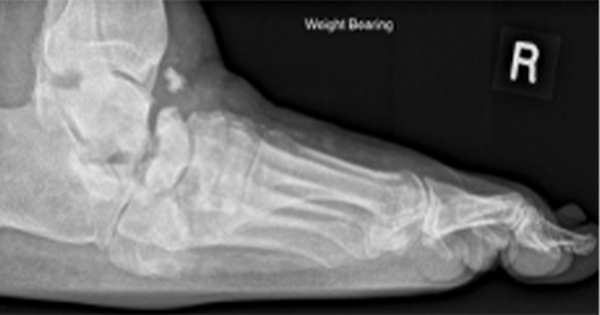Foot in Diabetes UK (FDUK) is a UK collaborative of healthcare professionals (HCPs) working across national boundaries to deliver high-quality clinically effective care in order to improve the lives of people living with foot problems associated with diabetes. There is an urgent and unmet need across the UK to reduce the number of avoidable lower-limb amputations and decrease the huge disparities in amputations experienced by people with diabetes (PwD). In view of the recognised inequalities and variations in amputation rates across the UK, the FDUK’s Zero All Preventable (ZAP) amputations group is committed to reducing these unacceptable outcomes for PwD. In order to achieve this, it is important to avoid delays in accessing specialist care and non-attendance for such care — so-called “missingness” (McQueenie et al, 2019; Robbie et al, 2022).
In the first part of this statement, the unmet need in providing foot care for PwD is highlighted and rapid access to specialist foot care is proposed as a crucial aspect of such care to avoid delays and non-attendance. The second part discusses the individual factors that may delay or prevent PwD from accessing foot care, notably encompassing psychological challenges and limitations of poor health literacy. Recent advances in the provision of psychological therapy to address unmet mental health needs are also outlined.
The current situation and the unmet need
At present, more than 5 million people currently live with diabetes in the UK and 12 million are at high risk of developing the condition (Diabetes UK, 2023). In Scotland, data from 2020 showed that 2.2% of people with type 2 diabetes (n=2,399) were recorded as having active foot disease, and 6.3% of people with type 2 diabetes (n=6,746) were at high risk of amputation (NHS Scotland, 2020).
PwD fear lower-limb amputation more than death (Wukich, et al, 2018) and there is an unmet need in the prevention of amputation.
In England, the number of major lower limb amputations (above the ankle) continues to be high in PwD. From 2018-2021, there were a staggering 7,766 major amputations in PwD. The rate of major amputations per 10,000 PwD in England is 7.7 when standardised for age and ethnicity, which has slightly decreased since 2020/21 but still remains unacceptably high (Office for Health Improvement and Disparities, 2022).
Within these headline figures, there are gross disparities. The rate of major lower-limb amputations in the most deprived areas in England is between 1.47 and 1.82 times higher when compared with the least deprived areas (Office for Health Improvement and Disparities, 2022). Major amputation rates are 30% higher in the north of England than the south, with a 50% variation across regions (Ahmad et al, 2014a). Furthermore, the amputation rate is 2.7 times higher in men than in women. However, it is worth noting that South Asians experience the lowest rate of major lower-limb amputation in England compared to both Black and White populations (Ahmad et al, 2014b).
Additionally, it has been well-documented that major lower-limb amputation results in early mortality in PwD, especially in men who are in their mid-60s with type 2 diabetes (Jupiter et al, 2016). While the 5-year mortality for foot ulceration is 30.5%, minor and major amputation rates are 46.2 and 56.6%, respectively (Armstrong et al, 2020).
Recent work by Hurst et al (2020) has shown that mortality rates are associated with social deprivation and form geographical neighbourhood clusters in PwD who have foot ulceration or lower-extremity amputation.
This overall situation of health and social care disparity is no longer acceptable and needs to be addressed for moral, clinical and financial reasons. In 2014/15, diabetes-related foot care accounted for nearly 1% of the entire NHS budget — approximately £1 billion (Kerr et al, 2019).
Unless there is significant intervention the personal, social and fiscal costs of diabetes-related ulceration and amputations will only get worse.
The need for rapid access to specialist foot care
More than 80% of lower-limb amputations are preceded by diabetes-related foot ulceration (Pecoraro et al, 1990). Amputations occur because the foot in diabetes has an aggressive, time-dependent natural history that progresses from ulceration to gangrene and is driven by infection and/or ischaemia (Mishra, 2017). This natural progression often defeats healthcare systems because the urgency of presentation is often not fully appreciated and given the priority it demands by patients, their carers and healthcare professionals.
“Time is tissue”, as Vas et al (2018) said, and delays in diagnosis and treatment can result in a real risk of lower-limb amputation. Thus, it is important for PwD to present for treatment without delay, and for clinicians to be able to recognise early signs of ulceration, ischaemia and infection and refer individuals to specialist care to ensure the prompt initiation of appropriate treatment (Edmonds et al, 2020).
The focal point of specialist care is the diabetic multidisciplinary foot team (MDFT) (National Institute for Health and Care Excellence [NICE], 2023). Recent systematic reviews have confirmed the positive impact of the MDFT, which acts as the hub and centre of care and should be easily available and accessible to patients and healthcare professionals (Crawford et al, 2020).
NICE (2023) advocates that PwD and acute diabetes-related foot problems should be referred within one working day to the MDFT or foot protection service (according to local protocols and pathways) for triage within one further working day. Furthermore, individuals with limb-threatening or life-threatening foot problems, such as ulceration with limb ischaemia, fever, any signs of sepsis, deep-seated soft tissue or bone infection or gangrene, should be referred immediately to acute services, with the MDFT being promptly informed.
Why do delays and non-attendance (“missingness”) in accessing treatment occur?
In a study of European healthcare systems, delays in referral to specialist foot care teams were common (Manu et al, 2018). It was further recognised that there should be education for GPs, nurses and PwD to raise awareness of the risk of foot ulceration and the need for prompt referral to specialist diabetes foot care services.
Delays which lead to the PwD presenting late or not at all to the MDFT occur when;
- The person develops a foot problem and delays making a decision to seek treatment because of a lack of concern about the problem. This could reflect an underlying psychological issue or poor health literacy
- The person sees a first contact healthcare professional who delays or fails to make a decision to refer to specialised care
- There is a delay during the referral process to access specialised care (Pankhurst and Edmonds, 2018).
Difficulty in accessing specialist foot care due to unmet psychological need
At all stages of the foot care pathway, PwD should be encouraged to access support and treatment as early as possible to prevent complications. However, there are barriers that can impact their engagement and attendance at specialist services, including the multidisciplinary foot team (MDFT) (Robbie et al, 2022), and hinder their access to early treatment. Healthcare professionals play a crucial role in identifying these barriers, which may include psychological difficulties, high levels of distress associated with living with diabetes, learning difficulties, individual beliefs, or psychosocial factors.
There is a strong association between depression and ulceration, as well as Charcot arthropathy. Low mood can also impact engagement and/or attendance in the diabetic foot clinic. The combination of diabetes and depression may lead to issues with cognition (Moulton et al, 2016; Saedi et al, 2016; Yoon et al, 2017) and reduced physical activity (Sehlo et al, 2016), both of which may delay accessing specialist care. There is an increased risk of mortality related to delays in seeking or accessing healthcare, in which psychological issues can play an important part.
Delays also result from financial issues associated with maintaining income and avoiding costs allied to care, inappropriate advice or limited access to advice in primary care, ability to self-care, affordable nutrition and/or availability of suitable footwear (Leese et al, 2013; Margolis and Jeffcoate, 2013). There is a three-fold increased risk of death in people presenting with initial ulceration of the foot (Ismail et al, 2007), with psychological factors accepted as prognostic elements in relation to mortality in PwD (Katon et al, 2005).
PwD report higher levels of psychological distress, including depression, when compared to people without diabetes (Rotella, 2013). Higher levels of distress have been linked to poorer diabetes self-management, as measured by HbA1c levels, in individuals with type 1 and type 2 diabetes (Fisher, 2010; Hessler, 2017). This has been further demonstrated in a small study by Hardenberg and Robinson (2018) which showed improvements in HbA1c levels in patients who received psychotherapy.
Regrettably, it is often difficult for a PwD to obtain psychological help due to gaps in the diabetes pathway. Psychological support can help support individual self-management, enhance engagement in treatment, nurture positive relationships and improve connections between those involved in the clinical management of the lower limb in diabetes.
Gaps in the psychological pathway
In the Too Often Missing report (Diabetes UK, 2019), PwD report that their emotional and psychological needs are not being met. A gap exists between physical and psychological care, despite almost half of people with psychological difficulties having at least one long-term physical health condition, and 30% of people with long-term physical health conditions also having a psychological issue (Diabetes UK 2010; Naylor et al, 2016).
Mental health services often lack diabetes specialist knowledge and diabetes specialists seldom receive psychological training, resulting in missed opportunities for integration and engagement of PwD. Some services may be less familiar with specific self-harm risks associated with diabetes, such as insulin overdose leading to the use of emergency services, as these risk factors were not noticed or identified sooner. Diabetes teams may also be less vigilant in identifying other self-harm risks that mental health professionals may identify more promptly.
The adapted pyramid of need highlights some gaps in existing psychological and emotional provision (Sachar et al, 2020). ‘IAPT’ (Increasing Access to Psychological Therapy; now called the ‘NHS Talking Therapies, for Anxiety and Depression’ programme), generally help people at the lower levels of the pyramid (e.g. level 2), while those with more complex mental health problems or in crisis are usually seen at the highest level (level 5).
The current psychological gap for PwD exists in the middle of the pyramid (levels 3 and 4) and includes complex psychological issues and diabetes foot care problems. For example, severe depression, anxiety, diabetes distress, social difficulties, phobias and/or disordered eating when coupled with treatment adherence difficulties can lead to poor outcomes.
When offering treatment for a mental health disorder or making a referral, NICE (2011)advises the stepped-care approach, which involves offering or referring for the least intrusive and most effective interventions.
While NHS Talking Therapies for Anxiety and Depression play a very important role in the mental health pathway, their scope is limited. For example, a diabetes foot care patient with a limb at high risk of amputation, a history of trauma, complex social stressors and difficulties engaging with services is unlikely to fit into a service designed to support patients with uncomplicated depression and anxiety. Models such as Sachar et al (2020) help inform the development of a psychological workforce with an aim to address the current unmet needs of diabetes patients. The From Missing to Mainstream action plan offers a values-based approach to diabetes psychology in Wales to help fill in the gap (All Wales Diabetes Implementation Group 2022).
To address the gap at levels 3 and 4 of the diabetes pyramid, a specialist diabetes counselling psychologist has been integrated into the foot care team at St George’s University Hospital NHS Foundation Trust. In this foot care clinic, individuals receive psychological assessment and treatment. This post has been in existence for 3 years and has recently expanded to include a new 1-year position focused on mapping psychological needs across the community and acute diabetes foot care pathway in south-west London.
The role of a specialist diabetes clinical/counselling health psychologist embedded into a foot care team includes direct clinical work as well as joint work with the team. The role also involves providing consultation, advice, training, supervision and support to the MDFT. The aim of an evidence-based psychological intervention is to support PwD to better self-manage through the reduction of depression or anxiety, making lifestyle changes or better adhering to treatment. Helping a PwD make decisions related to their care is also part of the role as is supporting families and carers. Embedding psychologically informed care into the MDT foot care team helps address unmet need and ensure that opportunities to promote psychological wellbeing for PwD foot care problems are maximised.
Difficulty in accessing specialist foot care due to poor health literacy
Low education and literacy rates are directly linked to health, and the importance of health literacy as a factor in health equality has become increasingly evident (Beauchamp et al 2015). Health literacy is defined as the extent to which individuals have the capacity to access, understand and use information to make decisions about their own health (and sometimes others) and includes the capacity to communicate and enable these decisions (Naik et al, 2011; Helitzer et al, 2012; Dodson et al, 2014).
In the UK, 7.1 million adults read and write at or below the level of a 9-year-old and 43% of adults do not understand written health information (Health Education England, 2023). Examples of personal health literacy include understanding prescription drug instructions, doctor’s directions and consent forms and having the ability to navigate the complex healthcare system. Health literacy can also be a barrier to accessing healthcare and appropriate clinics when needed. Cognitive defects and health literacy may be significant clinical risk factors for foot ulceration.
Health literacy has been studied with reference to an individual’s choices concerning their foot health and self-care. A meta-analysis of literacy studies and diabetic foot reported a non-statistically significant doubling of the odds of foot disease among people with inadequate compared with adequate health literacy (OR 1.99; 95% CI 0.83–4.78); which is potentially of clinical importance (Chen et al, 2018).
Lower health literacy scores, (often measured by reading ability and numeracy skills), are associated with higher avoidable hospitalisation rates (Baker et al, 2002), decreased ability to self-care (Reigel et al, 2009), poorer health outcomes, and higher mortality rates (Sudore et al, 2006; von Wagner et al, 2007; Peterson et al, 2011).
In a retrospective cohort analysis carried out in a large orthopaedic practice, PwD who had a foot amputation or subsequent amputation, in the past 2 years were 8.07 times more likely to have inadequate health literacy than individuals in the general orthopaedic group (Hadden et al, 2019; Martin et al, 2019). These findings highlight the importance of developing health literacy-based interventions that focus on diabetes self-management and foot assessment to improve clinical outcomes and prevent amputation.
Recommendations
Access to psychological services can be difficult and often an unrecognised issue for PwD. Poor mental health can contribute to delayed presentation to specialist services. Such waits can lead to poor outcomes in terms of amputation and early mortality. Sub-optimally controlled diabetic foot disease is the leading cause of amputation and mortality for PwD, especially when associated with psychological problems and gaps in the mental health and MDFT referral pathways. Once PwD reach an MDFT, their outcomes are expected to improve, and the number of avoidable/unnecessary major amputations can be reduced with potential savings generated for the NHS.
Recommendations for healthcare professionals
- There should be education and training for HCPs to empower them to recognise PwD who have psychological issues. Diabetes UK (2019) has identified a clear need for training and upskilling of HCPs to help them recognise the emotional and psychological needs of PwD. This is relevant to all HCPs working with diabetes (Diabetes UK, 2019), whether in primary care or specialist diabetes services.
- HCPs should receive ongoing education on assessing and identifying acute diabetes-related foot problems, including what to look for, who to refer to and how and when to refer. Referral protocols into specialist care should be simple to follow and easy to access. Where possible, self-referral pathways should be explored as a means of facilitating quick access and reducing delays that may result in catastrophic outcomes.
Recommendations for people with diabetes
- PwD should be educated in self management and foot assessment in health literacy training programmes that also include the recognition of acute diabetes-related foot problems and information given on how and when to reach specialist care.
- People with psychological needs should receive prompt assessment and treatment. Access to psychological services should be improved. PwD feel that they often do not have their emotional and psychological health needs met within existing diabetes care pathways (Diabetes UK, 2019). Investment is needed in psychological support within diabetes services and there needs to be integration between physical and psychological care in the NHS.
- The individual with mental health issues should be empowered to recognise foot problems and understand the prompt need to access services.
Recommendations for healthcare providers
- There should be rapid access to the MDFT. NICE (2023) stated that PwD who have limb-threatening or life-threatening foot problems, such as ulceration with limb ischaemia or with fever or any signs of sepsis or a deep-seated soft tissue or bone infection or gangrene, should be referred immediately to the acute services, with the MDFT informed. For all other active diabetes-related foot problems, PwD should be referred within one working day to the MDFT or foot protection service (according to local protocols and pathways) for triage within one further working day.
- There should be an investment of increased psychological support for PwD including people with foot problems.
Conclusion
This position paper has focused on:
- Empowering PwD with psychological issues to recognise foot problems and the need to access services
- Empowering healthcare professionals to recognise psychological issues and signpost PwD to access care
- Investing in psychological support within diabetes services.





